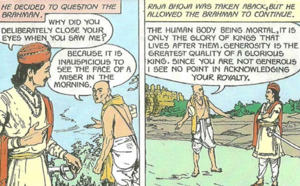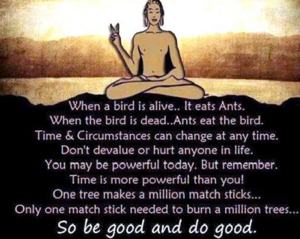Talk:Rājā Bhoja
By Vishal Agarwal
Rāja Bhoja, who ruled central India in the 11th century CE, is remembered as a wise and generous monarch celebrated for his patronage of scholars, poets, and artists. He established the renowned Sarasvatī Mandir at Vidishā (in present-day Madhya Pradesh), which became a notable centre of learning and culture.
Story: Flatterers are Plenty, Truth Speakers are Rare
In the early years of his reign, Bhoja was known for being frugal. One morning, while touring his capital, he encountered a brāhmaṇa who, upon seeing the king, abruptly turned his face away. Surprised by the apparent disrespect, the king summoned him and asked why he had refused to greet his sovereign.
The brāhmaṇa replied calmly,
- “Your Majesty, the pleasures and riches of this world are impermanent. Only the merit of our dharmic actions follows us after death. The glory of a ruler endures only through his generosity and righteous deeds. Since you are known to be miserly, it is considered inauspicious to behold the face of a miser in the morning. Therefore, I turned away.”
The sincerity of the brāhmaṇa impressed Bhoja deeply. He reflected,
- “A ruler may easily find flatterers, but those who speak truth with courage are rare.”
Moved by the encounter, Bhoja invited the brāhmaṇa to deliver a daily discourse at his court. From that day onward, Rāja Bhoja transformed into a benevolent and magnanimous patron of learning, revered by poets and scholars throughout his realm.
Story: Benefits of Reading Scriptures
A traditional account from the reign of Rāja Bhoja tells of a virtuous brāhmaṇa who, though highly learned in the śāstras, lived in great poverty. Too proud to beg, he eventually succumbed to desperation and resolved to steal from the royal palace.
Under the cover of darkness, the brāhmaṇa entered the palace and reached the royal chamber where the king and queen were asleep. Precious jewels and ornaments lay scattered about, but just as he was about to take them, he remembered a verse from the śāstras forbidding theft. Overcome by remorse, he refrained from the act.
As dawn approached, he realized escape was impossible without being seen, so he hid beneath the royal bed. Soon, the attendants entered with music to awaken the king and queen. Pleased with the morning, Rāja Bhoja recited three quarters of a verse celebrating the pleasures of life.
Unable to resist, the hidden brāhmaṇa completed the verse aloud, saying:
- “But none of these remain when the eyes are shut.”
Startled, the king bent down and discovered the scholar. The guards rushed forward, but Bhoja restrained them and asked for an explanation. The brāhmaṇa confessed his intention and how the teachings of the scriptures had saved him from wrongdoing. Impressed by his honesty and learning, Bhoja declared,
- “Since you have followed the teachings of the śāstras, I shall not let you go empty-handed. You have completed my verse with wisdom, and I value true scholarship.”
The king then rewarded the brāhmaṇa with valuable gifts, honouring him as a man of virtue and learning.
Story: We Take Nothing Upon Death
According to another traditional account, when Rāja Bhoja lay on his deathbed, he summoned his prime minister and gave him an unusual instruction:
- “When my body is taken to the cremation ground, expose both my arms. Paint one arm white and the other black.”
Puzzled, the minister inquired about the reason. The king explained,
- “My bare hands will show that I came empty-handed into this world and will leave it the same way. None of my riches will accompany me after death. The colours will signify that only my deeds—white for virtue and black for sin—will follow me into the next world.”
This symbolic act was meant to remind his people that worldly possessions are transient, but karma, the sum of one’s righteous and unrighteous actions, determines one’s true legacy beyond death.


